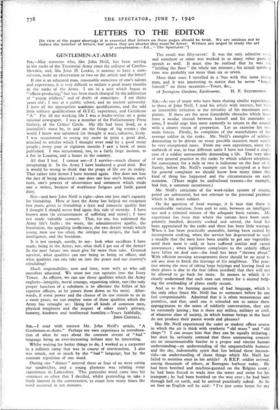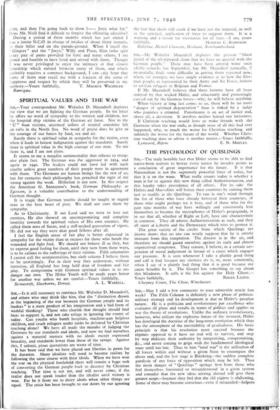SIR, —As one of many who have been sharing similar experiences
to those of John Neil, I read his article with interest, but with an irresistible irritation at the triviality of his maximum com- plaints. If these are the most formidable obstacles which frus- trate a modus vivendi between himself and his comrades in arms, I would urge him most earnestly to return to the assault with a clearer vision of proportion. Let us examine his two main fences. Firstly, he complains of the wastefulness of the average soldier in the ranks. Mr. Neill's examples of soldiers demanding to be driven on every possible occasion must surer• be very exceptional cases. From my own experience, since the outbreak of war, in four different units I have not found a single case of a soldier unreasonably demanding a lift. The very idea of any general practice in the ranks by which soldiers telephone for conveyance for a mile or two is ludicrous on the face of it. Surely, before Mr. Neill's example can be accepted as a basis for general complaint we should know how many times this kind of thing has happened and the circumstances on each occasion. (There might be undisclosed reasons—for example, bad feet, a common occurrence.)
Mr. Neill's criticisms of the work-ticket system of issuing petrol are substantial, but not relevant to the personal problem which is his main subject.
On the question of food wastage, it is true that there is considerable variation, from unit to unit, between an intelligent use and a criminal misuse of the adequate basic rations. My experience has been that where the rations have been com- petently handled, decently cooked and served, the food has been appreciated by the ranks and there has been little wastage. When it has been practically uneatable, having been ruined by incompetent cooking, when the service has degenerated to such a muddle that the men have been unable to get any vegetables until their meat is cold, or have suffered similar and varied annoyances ; when legitimate complaints to the orderly officer have fallen on deaf ears—the food has been " thrown about." With efficient messing arrangements there should be no need to ask any man to finish the leavings of his neighbour. The prac- tice among the men of taking large helpings and leaving food on their plates is due to the fear (often justified) that they will not be allowed to go back for more. In messes in which it is clearly understood that each man can return for a second help- ing the overloading of plates rarely occurs.
And so to the burning question of bad language, which is the only other fence Mr. Neill has to surmount before he can feel companionable. Admitted that it is often monotonous and pointless, and that, until one is schooled not to notice these appoggiaturas to the notes of soldierly conversation, they can be extremely jarring ; but is there any milieu, military or civil, of whatever class of society, in which human beings in the herd do not produce their parrot words anti phrases?
Has Mr. Neill experienced the cadet or student officer course in which the air is thick with synthetic " old mans " and " old chaps "? I can assure him that they can be equally irritating ; but does he seriously contend that these unmeaning conceits are an unsurmountable barrier to a proper and sincere human understanding—an understanding of the unquenchable humour and the shy, indomitable spirit that lies behind these inessen- tials—an understanding of those things which Mr. Neill has failed to mention once in his article? A B.E.F. soldier arrived, among thousands of others, at Ramsgate harbour today. He had been bombed and machine-gunned on the Belgian coast ; he had been forced to wade into the water and swim for his transport ; he had been bombed on the way over ; he had been through hell on earth, and he arrived practiCally naked. As he set foot on English soil he said: " I've just come home for my iirt, and then I'm going back to show f— Jerry what for." Does Mr. Neill find it difficult to forgive the offending adjective?
During a period of three months which has just ended I was a junior N.C.O. in charge of intakes of about thirty recruits, in their billet and on the parade-ground. When I recall the
Gingers " and the " Joeys," Willy and Pluto, Slim (who split every pair of pants provided for him) and many others, I am proud and humble to have lived and served with them. Though I was never privileged to enjoy the intimacy of that closest friendship which existed between many of them, and which probably requires a common background, I can only hope that some of them may recall me with a fraction of the sense of happiness and respect by which they will be preserved in my



































 Previous page
Previous page